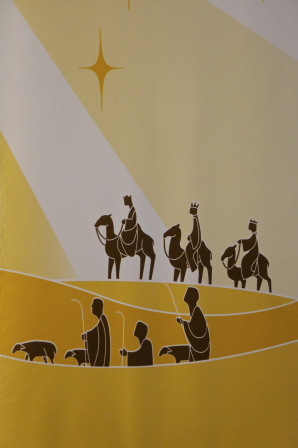 Church Banner (2017)
Church Banner (2017)
Today, 12 days after Christmas, is the traditional date to celebrate Epiphany. In recent years, however, the celebration moved to the Sunday following the feast of Mary, the Mother of God on January 1st. Epiphany is the feast of the manifestation of Christ to the world, in particular to the Gentiles.
The feast of Epiphany is also referred to as the Feast of the Three Kings or the Feast of the Magi. Who were these Magi and what lessons can we learn from their story? Magi is the plural of magus, a wise person or magician with special powers. Magus also refers to a member of a priestly class of ancient Persia (today, the country of Iran). In the Epiphany story, we generally assume that there were three magi. They were astrologers (scientists) who had been studying the stars for many years.
I would like to reflect on five key themes of Epiphany found in Sunday’s Scripture readings:
Rise up in splendor, Jerusalem! Your light has come, the glory of the Lord shines upon you. (Isaiah 60:1)
Coming toward the end of the Christmas Season, Epiphany continues the theme of light that was started in Advent: Christ as the light of the world; we ourselves as a light to the world; the Magi following a light to encounter God in a newborn child.
 Light on a Winter Morning (2017)
Light on a Winter Morning (2017)
On of my favorite hymns on the theme of light is Bernadette Farrell’s Christ, Be Our Light (OCP, 1993, 2011). I am including verses 1, 2, and 5 here.
Make us your own, your holy people, light for the world to see.
Christ, be our light! Shine in our hearts. Shine through the darkness.
Christ, be our light! Shine in your church gathered today.
Your word alone has pow’r to save us. Make us your living voice.
Let us be servants to one another, making your kingdom come.
2. Recognizing God in the lowly and poor
For he shall rescue the poor when he cries out, and the afflicted when he has no one to help him. He shall have pity for the lowly and the lives of the poor he shall save. (Psalm 72:12-13)
The Magi, often thought of as kings, recognized God in a very unlikely situation – a poor family in a lowly place. Scott Soper composed a hymn that is appropriate for Epiphany. It is often sung in alternating verses with “What Child Is This?”
“Child of the Poor” by Scott Soper (OCP, 1994)
Helpless and hungry, lowly he lies, wrapped in the chill of midwinter;
Comes now among us, born into poverty’s embrace, new life for the world.
Who is this who lives with the lowly, sharing their sorrows, knowing their hunger?
This is Christ, revealed to the world in the eyes of a child, a child of the poor.
Who is the stranger here in our midst, looking for shelter among us?
Who is the outcast? Who do we see amid the poor, the children of God?
Bring all the thirsty, all who seek peace; bring those with nothing to offer.
Strengthen the feeble, say to the frightened heart: “Fear not: here is your God!”
3. Truth that extends to the whole world
The Gentiles are coheirs, members of the same body, and copartners in the promise in Christ Jesus through the gospel. (Ephesians 3:6)
The Magi came from ancient Persia, modern-day Iran. God revealed God’s self to those outside the covenant relationship of ancient Israel, that is, the Gentiles. Do we believe that wisdom can come from the East or the Middle East? Do we accept the idea that we can find truth in worlds other than our own, or do we believe that we have a monopoly on truth?
 Walkway (2017)
Walkway (2017)
4. Allowing an encounter with God to change us
[The magi] departed for their country by another way. (Matthew 2:12)
What if we substituted by with in? After they encountered God, the magi were changed. They went home in a different way? They were no longer the same; they looked at life in a different way. Do we allow God to change us once we have encountered Christ in unlikely circumstances? Are we even open to look at life in a different way?
5. Offering our gifts, the best of what we have
This last theme comes from a reflection of Sr. Fran Ferder, cited in Give Us This Day, December 2017. The Magi brought gifts of gold, incense, and myrrh. They also brought their personal gifts of knowledge, wisdom, influence, courage, and presence — without knowing how their gifts would be received.
As sons and daughters of God we too have our very own star – our personal appeal, our individual influence, our unique way of incarnating the holy. We have gifts to offer. Some of us travel a long way to find the reception that the Magi found.
May we see the Light and follow it. May we be generous with our gifts, offering others the best of what we have. May we appreciate the gifts that strangers bring us and the mysteries that they reveal. May we be flexible about changing our routes and about leaving in another way.
Advertisements Share this:





